‘Barbarian’, ‘Don’t Breathe’, and Getting the F*** Outta Detroit
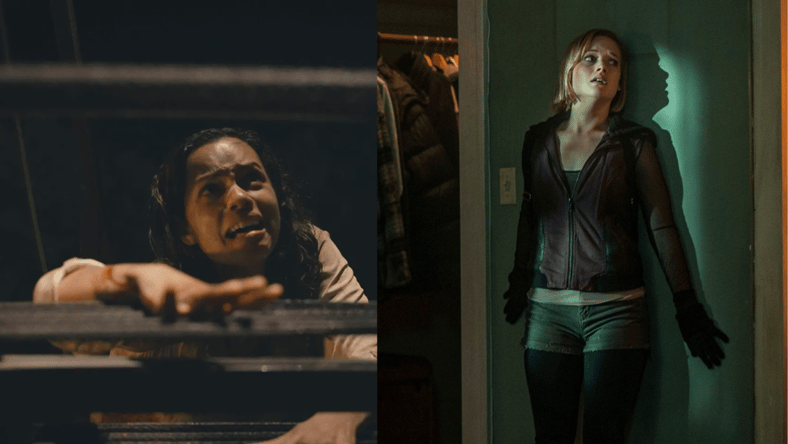
As horror movie real estate goes, every city’s got at least one haunted house with all the creepy amenities: the creaky floors and swinging doors, the terrible history, the foreboding basement. The Airbnb in Barbarian is the only well-kept house in an abandoned suburb in Detroit, much like the Blind Man’s home in Don’t Breathe. Tess thinks the Airbnb is her port on a dark and stormy night; Rocky believes that robbing a man blind is her ticket out of Motor City. That is, until our protagonists set foot in the basement. Escaping the horror movie basement is one thing. Escaping the sins of capitalism is another—and a mother.
In Zach Cregger’s Barbarian, Tess (Georgina Campbell) finds that her Airbnb has also been booked by a man named Keith (Bill Skarsgard). By all accounts, she should leave. It’s the middle of the night and she’s in unknown territory. But she has an interview the next day—a research position for a documentary filmmaker who covers jazz collectives and creative communities. She chooses to tough it out.
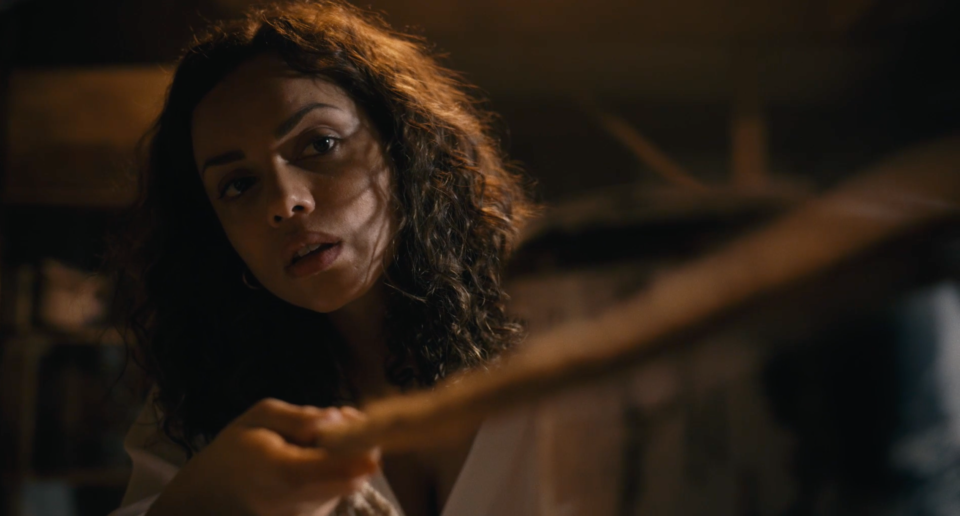
The panorama of Barbary Street at night, with but one streetlight like a beacon of flickering hope, makes the silhouette of surrounding houses look like an encroaching disaster. The following morning, when Cregger pulls the same panorama going the opposite direction, Tess sees the real story: homes broken and abandoned, paint weathered and marred by graffiti, decks in shambles, and gaping holes where front doors and windows used to be like faceless husks. Or screams frozen in time. The horror as she leaves for her interview is realizing that the disaster happened long before she set foot in Detroit.
The City of Detroit
Detroit was once a modern mecca. It was the birthplace of Motown Records—as well as horror maestro Sam Raimi—and the automotive hub of America, hence, Motor City. An explosion of jobs in the early 20th century meant a wealth of opportunity in a booming industry. Families and newer generations flocked to Detroit’s industrialized sector, leading to its rise as the fourth-largest city in the country.
The dream capsized at the onset of automation. Jobs vanished as the car companies consolidated; production moved out of the city, leaving scores of warehouses behind. Racial tensions rose while opportunity evaporated. Schools, buildings, businesses, and whole communities were abandoned going into the next century. A single-industry economy stalled out, and Motor City became Empty City. In 2013, Detroit declared bankruptcy.
Enter Rocky
This is where we find Rocky (Jane Levy) in Fede Alvarez’s Don’t Breathe, released in 2016. (Alvarez, who remade Raimi’s Evil Dead, found a horror muse in his mentor’s backyard.) Both Barbarian and Don’t Breathe utilize Detroit more than a mere backdrop. Filmmakers often boast that the settings for their movies function “like a character.” In the case of Barbarian and Don’t Breathe, Detroit ought to get top billing. Cities can’t talk, but empty neighborhoods tell a frightening story: this is the unchecked monster of capitalism, where corporations rise at the cost of everybody else.
And when the big businesses leave for greener profit pastures, they take the American dream with them—a zero-sum game that creates appalling monsters of its own. Detroit’s economic collapse looms like a specter, ever-present in every frame. It informs why Tess in Barbarian is here, and why Rocky in Don’t Breathe has to get the fuck out.
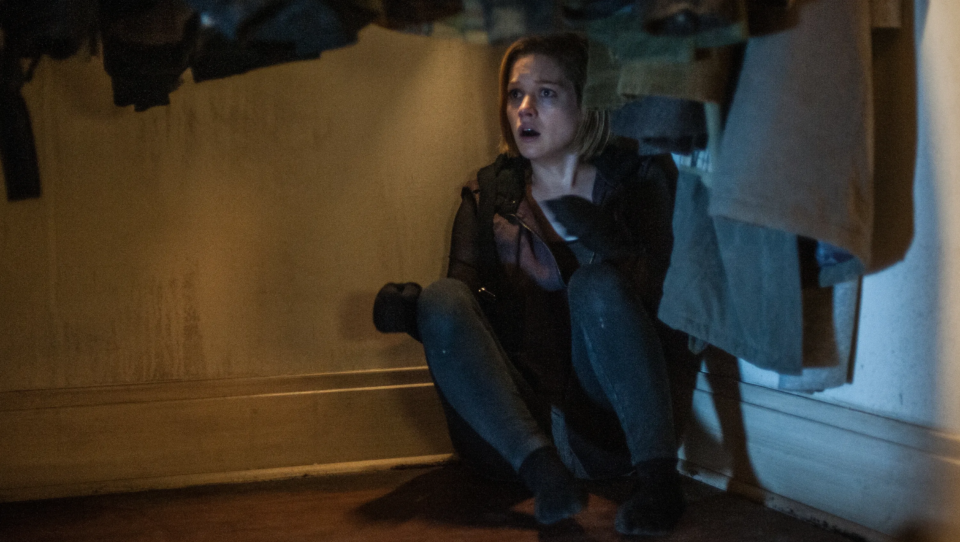
Unlike Tess, Rocky is from Detroit. This is the hand she’s dealt, the ghost town she calls home. You don’t get to choose the home you grow up in or your upbringing. She tells Alex (Dylan Minnette) about a drunk mother who locked her in the trunk. It serves as punctuation to her dream of running away to California in search of a better life, while Tess is here for opportunity. Rocky, bottom line, intends to put Detroit in her rear-view mirror as fast as possible with her little sister in tow.
Robbing The Blind
Rocky, Alex, and Money (Daniel Zovatto) are small-time burglars who steal from Detroit’s upper middle class, which may as well be upper. They drive down barren streets and hang out in empty restaurants, while Money does his deals in derelict factories. They may plunder rich houses, but that 60-second thrill doesn’t mitigate the hardship of living in Detroit. Then they get a tip about the Blind Man (Stephen Lang) who happens to be sitting on $300,000.
Just like the house in Barbarian, every other home on Buena Vista Street has been abandoned, looted, cashed out. As Money tells his co-conspirators, the Blind Man is the “last man standing” on the block. They skim over the fact that he lost a daughter in a car accident and that the girl responsible was born to rich parents who paid the six-figure settlement to avoid jail time. All they see is a bank vault and their freedom. This is what they learn having inherited the greed and apathy around them—they’ve become bankrupt themselves. To them, the world is a free-for-all, and the only opportunity is up for grabs.
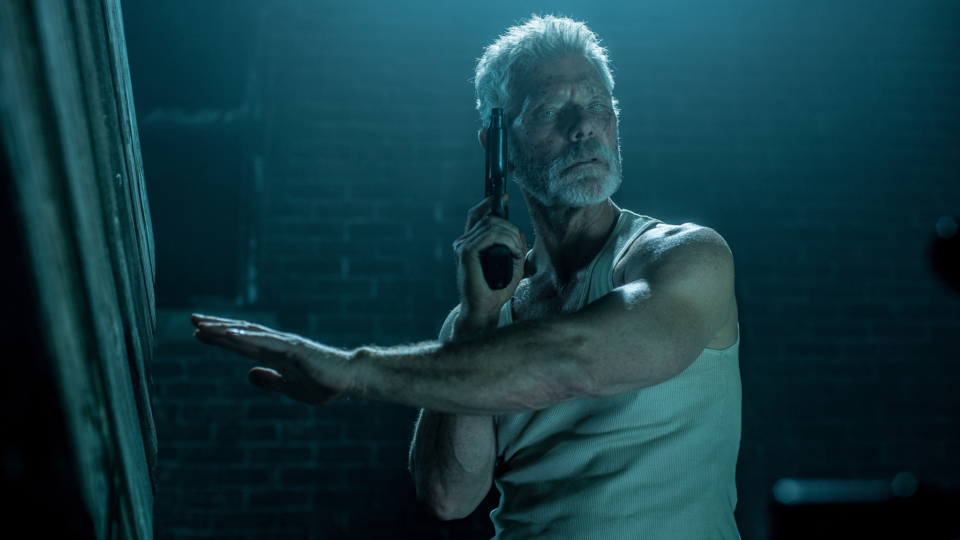
The three of them go in blind, so to speak. The Blind Man’s grief story is sadder than they realize: their living room devoid of color or joy, picture frames are upside down, and a home video of his daughter plays on a loop to torment him to sleep. Her ghost fills this barren home, including the contents of the safe they’re after.
When The Plan Goes Wrong
When Money preps the sleeping gas to incapacitate the Blind Man, he’s awoken upright in the brief cutaway and eerily stares in Money’s direction. He may be a war veteran with trained survival instincts, but in that instant he seems supernatural, like the painting in the gothic mansion whose eyes seem to follow you. Lang also has chiseled arms that make him look like the statue that moves when you’re not looking.
The break-in goes wrong. Money is overpowered and gets killed, and Rocky and Alex get trapped in a silent house where every misstep is a landmine, with the Blind Man lurking over their every move. Their only way out is through the basement, and it’s there they find Cindy (Franciska Törőcsik), the girl who killed the Blind Man’s daughter, now a prisoner. Worse, she’s pregnant with a replacement child.
Hell Is A Dark Basement
By the time Tess finds the dungeon beneath the Airbnb, we’ve been conditioned to think everything there is to fear is outside the rental than within. At her job interview, when Tess tells the documentarian where she’s staying, the filmmaker is gravely concerned for her wellbeing. On the way back, a homeless man chases after Tess, where she again retreats into the Airbnb’s safety. Then she finds a secret passageway in the basement and a room with a bloody handprint.
Tess and Rocky break the cardinal rule of horror: don’t go into the basement. In Don’t Breathe, it’s Rocky and Alex’s momentary way out, where they become Cindy’s way out too. In Barbarian, Keith goes into the basement to show Tess there’s nothing to be afraid of. She then goes down the tunnel after him because she has a heart—a trait that becomes her saving grace in the end.
Meet Mother
In the caverns, we’re introduced to the overgrown inbred tenant known as Mother, who comes screaming out of the darkness and bashes Keith’s head in. It seems we’ve met our monster, the titular barbarian. Mother might be monstrous, but she’s not the actual villain of the movie. As Andre (Jaymes Butler), one of the vagrants in the area, warns Tess, “she ain’t even the worst thing in there.”
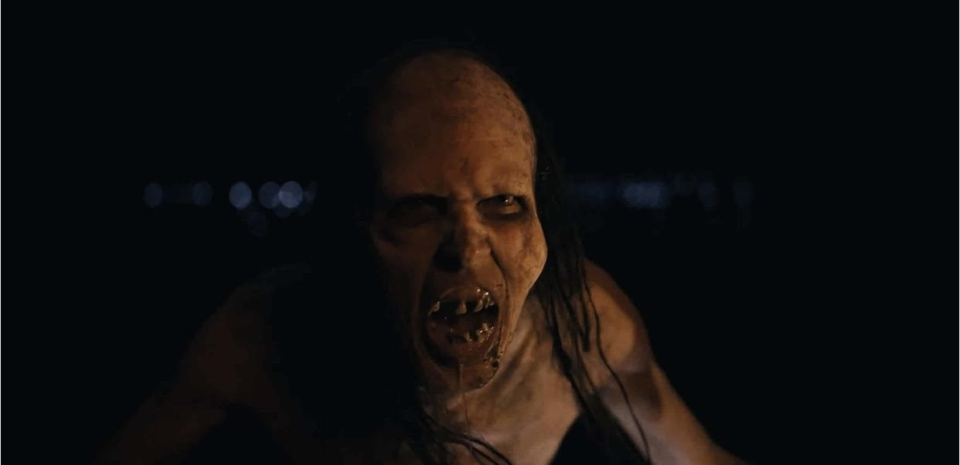
The Airbnb’s owner, AJ Gilbride (Justin Long), is our way into the rankest room in these caverns. He meets Frank (Richard Brake), who appears to be a longtime prisoner. Turns out he’s the house’s original owner long before AJ, and a serial abductor, rapist, and murderer. It would be AJ to discover him, who’s facing rape charges in California and came to Detroit to sell off properties to shore up legal expenses. He winds up in the same situation as Tess, a prisoner at the bottom of the basement.
Mother’s Origins
In a 1980s flashback, we see a younger Frank on Barbary Street, then a bustling neighborhood. It’s a seemingly realized portrait of the American dream, until his neighbor clues us in to the bigger picture: “Neighborhood’s going to hell.” Perhaps the domino effect of hard times has caught up to their neck of Detroit. Or a wave of “white flight” is underway. When the neighbor asks if Frank will join their departure, he says, “I’m not going anywhere.”
After the fallout, corporations gradually took over Detroit’s city center, fostering an economic rebuild but only as far as the city limits. Those in the suburbs were cut off from social services and support, virtually displaced. As Tess drives to the city for her interview, the difference between the suburbs and the revived metro area is night and day.
Since she’s staying in an abandoned area, she’s treated as such. When she escapes Mother’s clutches and calls the police, she’s more nuisance to them than actual concern. It’s a drag for them to come here, and we see how this moral indifference allowed a fiend like Frank to fester. Or enabled a brute like the Blind Man. The opening shot of Don’t Breathe shows him dragging a woman on the open streets with no one around to stop him. It’s later revealed to be Rocky, but it implies how he got away with doing the same to Cindy.
Richard Brake, Frank, And A Villain Most Foul
Frank saw an opportunity in the economic collapse, leaving his own trail of empty houses in his wake. Similar to his blind counterpart, he’s the last man standing. The Blind Man, however, distinctly draws a line at calling himself a rapist—like the fine line that separates Frank and AJ. Frank has no such boundary. Though the Airbnb is a single-story home, there are multiple implied horror stories beneath the basement. We see empty rooms and cages, but not what held them against their will; just shelves of tapes after the fact. Where the bodies are buried is left to the imagination, though the surrounding neighborhood could easily be a burial ground.
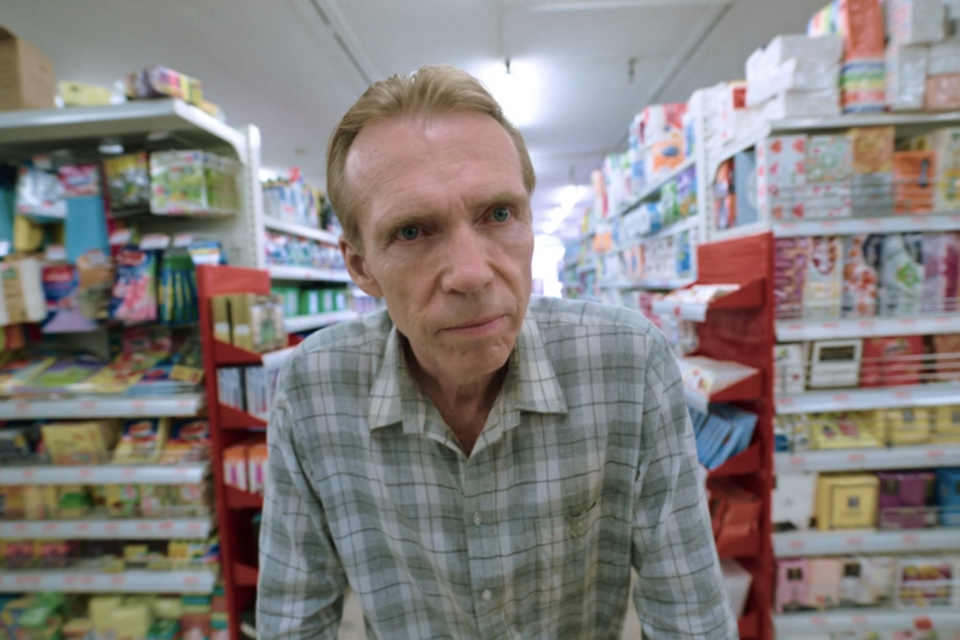
If Barbarian weaponizes its casting, then it does so especially with Richard Brake, who looks like the devil walking in human form. (Respectfully.) Frank is the boogeyman, the suburban legend told over a campfire. As Andre tells Tess and AJ of Frank’s victims: “He started making babies with them, and then babies with the babies.” Far down the line from an evil entity like Frank, Mother is her own kind of final girl. Tragically, she’s a product of the moral rot of her environment, taking literal monstrous shape.
The Deceptive Innocence of the Blind Man
If Frank in Barbarian is the devil, then the Blind Man in Don’t Breathe is the wailing spirit. Once Rocky and Alex discover Cindy as his captive, he goes from a grieving father to a monster in a matter of seconds. His cracked stone-white eyes make him look possessed where he wasn’t before, and he immediately scurries on the floorboards above to keep them from leaving. He’s the thing that goes bump in the night, the entity that appears in the infrared darkness. When he opens fire in the basement and accidentally kills Cindy, Rocky and Alex witness the wailing spirit phenomena in real time – the Blind Man grieving the loss of his baby.
The main characters in Barbarian and Don’t Breathe are victims of some kind. Mother is Frank’s victim of rape and incest, the Blind Man is a victim of an unjust system where the rich avoid consequence, while Tess and Rocky are doomed to inherit the oppressive circumstances. Capitalism’s rise and fall affords little room for everybody at the top; the climb is a free-for-all, so those on the bottom are pitted against each other in a self-defeating system. Crucially, Tess and Rocky aren’t trying to move up the economic ladder. In haunted house fashion, they want to get out. And neither Mother nor the Blind Man wants Tess and Rocky to leave, respectively.
Getting The F*** Out
Frank commits suicide in the basement, leaving Tess and AJ to face off against Mother. Instead of banding together, AJ reverts to his own self-interests and willingly sacrifices Tess atop the water tower. Tess had understood that Mother wasn’t a monster; she was doing what she’d been forced to do as a victim herself. Her escape got Mother out of the house, out of the bottomless pit, and it’s the two of them who join together. It’s Mother who saves Tess in the fall. AJ gets what’s coming to him, but the same cannot be said of the structure that turns poor souls against each other. In the end, Tess puts Mother out of her misery.

The free-for-all pits final girl against final girl, and forces friends to climb over each other’s corpse. Rocky escapes with the money, but at a cost. Alex dies in the scramble, and Cindy remains buried in the basement. There’s no resolve or justice to be had for Rocky, so she and her little sister pack their bags and put the ghost town of Detroit behind them, with the specter of the Blind Man’s eyes following her.
But There Is A Glimmer Of Hope
If there’s a hope, it resides in Tess. She had every reason to leave and she stayed. She got the job she came here for – a researcher for a documentary filmmaker covering jazz collectives. Detroit is where Motown Records was born, which famously set up shop in the neighborhood. Tess and other artists are investing in Detroit’s culture, not mining the city’s square footage for profit like a corporate entity. In fact, AJ was essentially doing what other businesses in Detroit have done: retreat in the name of self-preservation. Tess represents the hope that Detroit will recover by looking out for everyone else. But first, the Tesses and Rockys will have to wrangle with capitalism’s ghouls.
Categorized: Editorials
